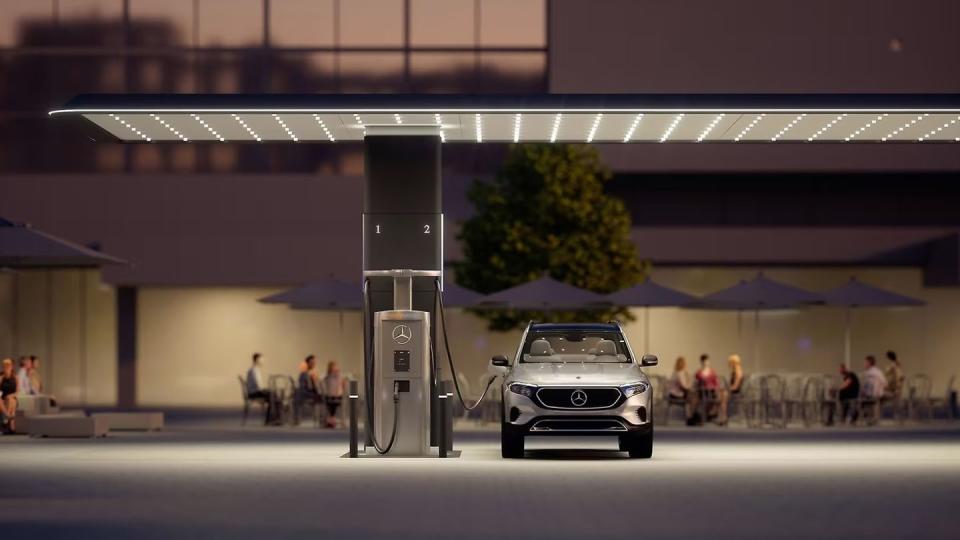This US City Will Join Mercedes-Benz Charging Hubs in Germany and China

Mercedes-Benz details plans for branded charging network, envisioning 10,000 charging points at over 2000 hubs.
The automaker plans to have the first 2000 charging points online by the end of 2024.
The first three hubs will open in cities in Germany, China, and the US, with Atlanta set to see the first one stateside.
Mercedes-Benz may have already revealed a timeline to adopt Tesla's North American Charging Standard, but this doesn't mean it is giving up on plans for its own charging network. The automaker is scheduled to open its first charging stations later this fall, with the first such station set to open in Atlanta in October.
Dubbed simply the Mercedes-Benz Charging Hub, the concept will kick off in two other cities to start, including Mannheim, Germany; and Chengdu, China. But the eventual goal is nothing short of massive: 2000 standalone hubs offering over 10,000 charging points. And Mercedes plans the first 2000 of those charging points, or one-fifth of the planned network, to be online by the end of 2024.
It's a major undertaking, and it's happening just as the automaker is introducing several new electric models in a very short span of time.
"Depending on region, the charging stations offer charging rate of currently up to 400 kW, provided via the respective standard charging systems CCS1, CCS2, NACS, and GB/T," the automaker notes.
The choice of location for the first US hub in Atlanta was perhaps inevitable: Mercedes-Benz USA is headquartered there. And the locations of other hubs will be logical as well, with Mercedes planning to position them in "main traffic areas and select Mercedes-Benz dealerships."
And the hubs themselves won't be open just to Mercedes-Benz vehicles—all EVs will be welcome. But Mercedes owners will get a few extra perks, including the ability to reserve spots ahead of time, assuring that a charging point will be open to them. As such, the hubs will have some similarities to Audi's charging hub concepts, which have already opened in several locations in Europe.
Porsche, part of the Volkswagen Group like Audi, is planning a similar network as well.
"Our goal is to create an infrastructure that offers electric vehicles reliable and easy charging options. In this way, we are actively supporting the transformation to electric mobility," said Franz Reiner, CEO of Mercedes-Benz Mobility AG.
So is Mercedes early or late to the station building effort?
Thus far, only Tesla has undertaken in a multi-year effort to build a charging network in North America for the benefit of owners of its cars. But that's quite understandable, as Tesla was a volume maker of EVs from the start, and it didn't want owners to rely on a patchwork of third-party stations.
With the overall EV adoption rate still in single digits in the US and Canada, there may not have been a pressing need for other automakers to invest in their own network of stations until a tipping point had been reached.
That tipping point may have now appeared on the horizon for some automakers, but isn't quite here for others. Established automakers, including the Big Three, did not opt to invest in such efforts until either a substantial percentage of their sales were electric, or have preferred to create partnerships with third-party networks, at least for now.
The reliability of those third-party networks, however, has now come to be seen as a barrier to EV adoption, or at least a point of anxiety, which is one of the driving forces behind the launches of branded charging hubs. In the US, it is only Volkswagen and Rivian that have embarked on station-building efforts, the former through its Electrify America network formed in the wake of the diesel crisis.
Mercedes-Benz will now join them, but it will take time to achieve the sort of geographic coverage Tesla created years ago.
Will branded charging hubs like these become commonplace in the next few years, or will this be a relatively confined concept? Let us know what you think.

 Yahoo Autos
Yahoo Autos 